Research Proposal on Dementia, Antipsychotics, and Patient Care
VerifiedAdded on 2023/01/20
|18
|5175
|98
Project
AI Summary
This research proposal investigates the complex relationship between dementia, antipsychotic medications, and patient care. It begins with an abstract outlining the study's aim to understand dementia and the effects of antipsychotic treatments, emphasizing the need to reduce their usage due to negative side effects. The proposal explores the problem statement, highlighting the trade-offs between the benefits and drawbacks of antipsychotics, and proposes strategies using non-antipsychotic drugs. The research aims to identify strategies to manage behavioral issues, reduce antipsychotic use, and improve care quality. It includes detailed research questions, objectives, and a gap analysis that emphasizes the need for practice changes. A literature review provides background on dementia prevalence, particularly in Australia, and the use of antipsychotics for behavioral and psychological disturbances. The proposal outlines the study's methodology, including data collection through interviews and surveys, along with qualitative and quantitative data analysis. The proposal addresses the ethical considerations for the study and outlines a plan for data collection and analysis to address the research question. The study seeks to improve the quality of life for dementia patients by minimizing the side effects of antipsychotic drugs and identifying effective alternative treatments.

Running head: RESEARCH PROPOSAL
Research Proposal
Name of the Student:
Name of the University:
ID of the Student:
Unit Code:
Research Proposal
Name of the Student:
Name of the University:
ID of the Student:
Unit Code:
Paraphrase This Document
Need a fresh take? Get an instant paraphrase of this document with our AI Paraphraser
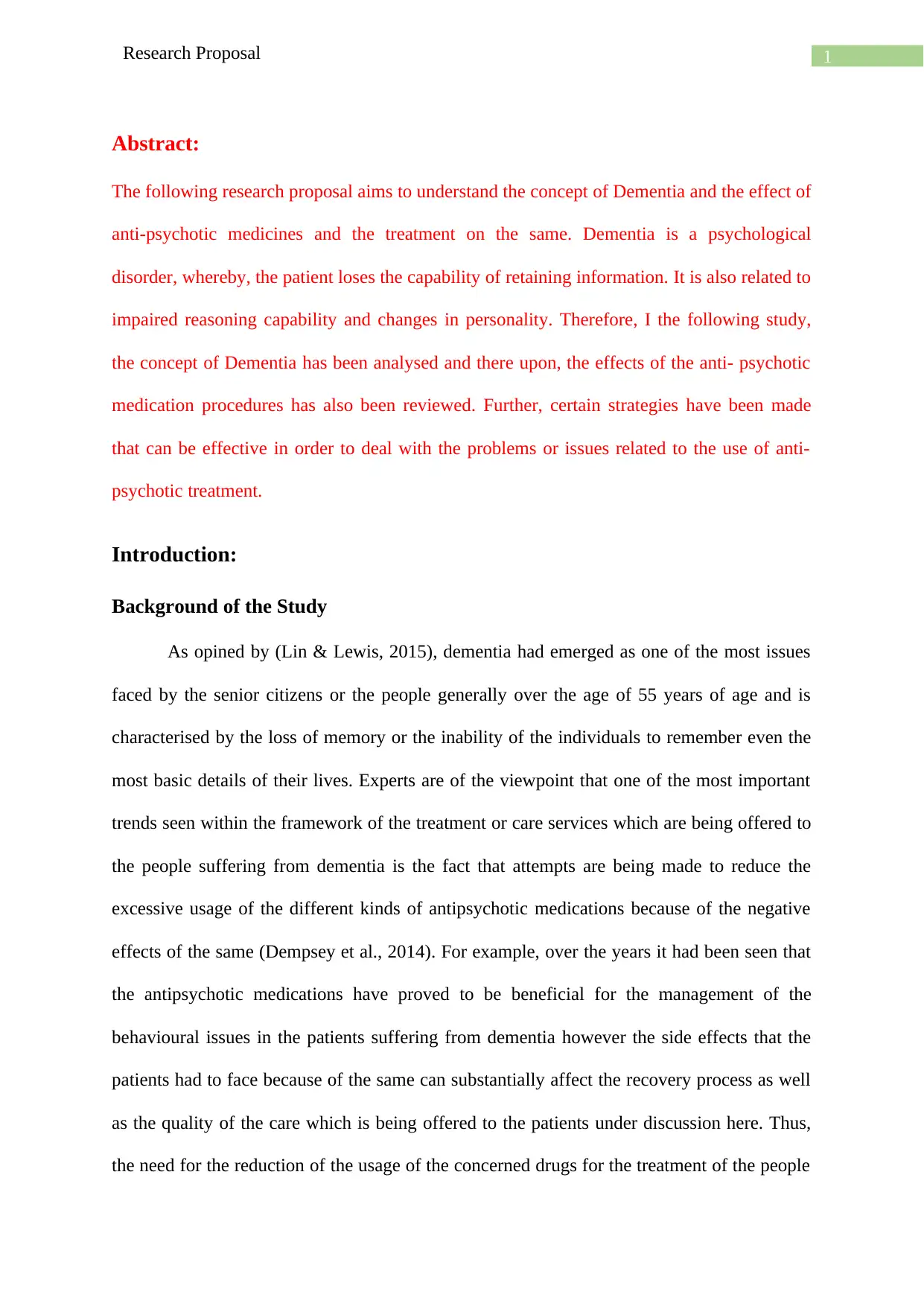
1Research Proposal
Abstract:
The following research proposal aims to understand the concept of Dementia and the effect of
anti-psychotic medicines and the treatment on the same. Dementia is a psychological
disorder, whereby, the patient loses the capability of retaining information. It is also related to
impaired reasoning capability and changes in personality. Therefore, I the following study,
the concept of Dementia has been analysed and there upon, the effects of the anti- psychotic
medication procedures has also been reviewed. Further, certain strategies have been made
that can be effective in order to deal with the problems or issues related to the use of anti-
psychotic treatment.
Introduction:
Background of the Study
As opined by (Lin & Lewis, 2015), dementia had emerged as one of the most issues
faced by the senior citizens or the people generally over the age of 55 years of age and is
characterised by the loss of memory or the inability of the individuals to remember even the
most basic details of their lives. Experts are of the viewpoint that one of the most important
trends seen within the framework of the treatment or care services which are being offered to
the people suffering from dementia is the fact that attempts are being made to reduce the
excessive usage of the different kinds of antipsychotic medications because of the negative
effects of the same (Dempsey et al., 2014). For example, over the years it had been seen that
the antipsychotic medications have proved to be beneficial for the management of the
behavioural issues in the patients suffering from dementia however the side effects that the
patients had to face because of the same can substantially affect the recovery process as well
as the quality of the care which is being offered to the patients under discussion here. Thus,
the need for the reduction of the usage of the concerned drugs for the treatment of the people
Abstract:
The following research proposal aims to understand the concept of Dementia and the effect of
anti-psychotic medicines and the treatment on the same. Dementia is a psychological
disorder, whereby, the patient loses the capability of retaining information. It is also related to
impaired reasoning capability and changes in personality. Therefore, I the following study,
the concept of Dementia has been analysed and there upon, the effects of the anti- psychotic
medication procedures has also been reviewed. Further, certain strategies have been made
that can be effective in order to deal with the problems or issues related to the use of anti-
psychotic treatment.
Introduction:
Background of the Study
As opined by (Lin & Lewis, 2015), dementia had emerged as one of the most issues
faced by the senior citizens or the people generally over the age of 55 years of age and is
characterised by the loss of memory or the inability of the individuals to remember even the
most basic details of their lives. Experts are of the viewpoint that one of the most important
trends seen within the framework of the treatment or care services which are being offered to
the people suffering from dementia is the fact that attempts are being made to reduce the
excessive usage of the different kinds of antipsychotic medications because of the negative
effects of the same (Dempsey et al., 2014). For example, over the years it had been seen that
the antipsychotic medications have proved to be beneficial for the management of the
behavioural issues in the patients suffering from dementia however the side effects that the
patients had to face because of the same can substantially affect the recovery process as well
as the quality of the care which is being offered to the patients under discussion here. Thus,
the need for the reduction of the usage of the concerned drugs for the treatment of the people
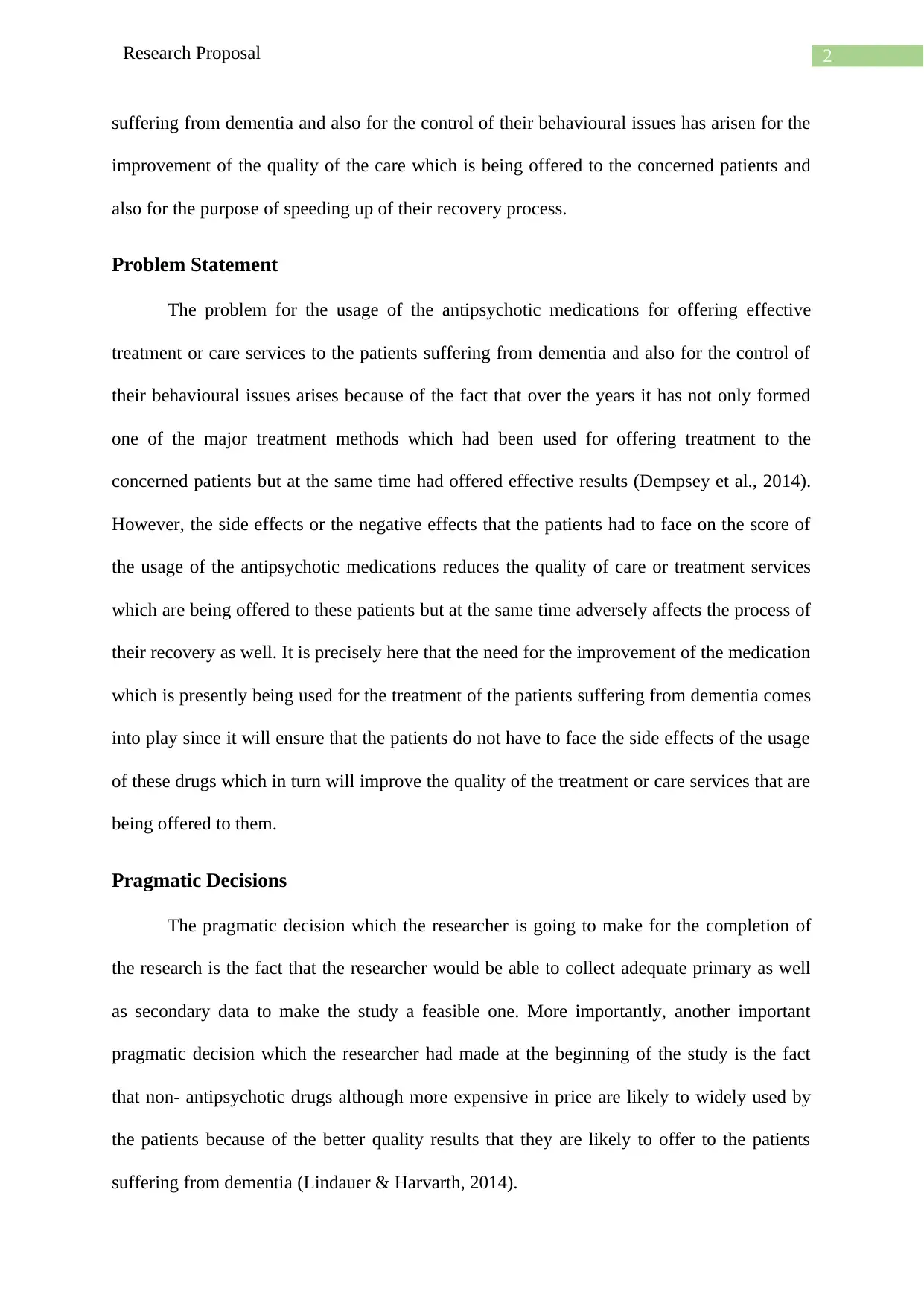
2Research Proposal
suffering from dementia and also for the control of their behavioural issues has arisen for the
improvement of the quality of the care which is being offered to the concerned patients and
also for the purpose of speeding up of their recovery process.
Problem Statement
The problem for the usage of the antipsychotic medications for offering effective
treatment or care services to the patients suffering from dementia and also for the control of
their behavioural issues arises because of the fact that over the years it has not only formed
one of the major treatment methods which had been used for offering treatment to the
concerned patients but at the same time had offered effective results (Dempsey et al., 2014).
However, the side effects or the negative effects that the patients had to face on the score of
the usage of the antipsychotic medications reduces the quality of care or treatment services
which are being offered to these patients but at the same time adversely affects the process of
their recovery as well. It is precisely here that the need for the improvement of the medication
which is presently being used for the treatment of the patients suffering from dementia comes
into play since it will ensure that the patients do not have to face the side effects of the usage
of these drugs which in turn will improve the quality of the treatment or care services that are
being offered to them.
Pragmatic Decisions
The pragmatic decision which the researcher is going to make for the completion of
the research is the fact that the researcher would be able to collect adequate primary as well
as secondary data to make the study a feasible one. More importantly, another important
pragmatic decision which the researcher had made at the beginning of the study is the fact
that non- antipsychotic drugs although more expensive in price are likely to widely used by
the patients because of the better quality results that they are likely to offer to the patients
suffering from dementia (Lindauer & Harvarth, 2014).
suffering from dementia and also for the control of their behavioural issues has arisen for the
improvement of the quality of the care which is being offered to the concerned patients and
also for the purpose of speeding up of their recovery process.
Problem Statement
The problem for the usage of the antipsychotic medications for offering effective
treatment or care services to the patients suffering from dementia and also for the control of
their behavioural issues arises because of the fact that over the years it has not only formed
one of the major treatment methods which had been used for offering treatment to the
concerned patients but at the same time had offered effective results (Dempsey et al., 2014).
However, the side effects or the negative effects that the patients had to face on the score of
the usage of the antipsychotic medications reduces the quality of care or treatment services
which are being offered to these patients but at the same time adversely affects the process of
their recovery as well. It is precisely here that the need for the improvement of the medication
which is presently being used for the treatment of the patients suffering from dementia comes
into play since it will ensure that the patients do not have to face the side effects of the usage
of these drugs which in turn will improve the quality of the treatment or care services that are
being offered to them.
Pragmatic Decisions
The pragmatic decision which the researcher is going to make for the completion of
the research is the fact that the researcher would be able to collect adequate primary as well
as secondary data to make the study a feasible one. More importantly, another important
pragmatic decision which the researcher had made at the beginning of the study is the fact
that non- antipsychotic drugs although more expensive in price are likely to widely used by
the patients because of the better quality results that they are likely to offer to the patients
suffering from dementia (Lindauer & Harvarth, 2014).
⊘ This is a preview!⊘
Do you want full access?
Subscribe today to unlock all pages.

Trusted by 1+ million students worldwide
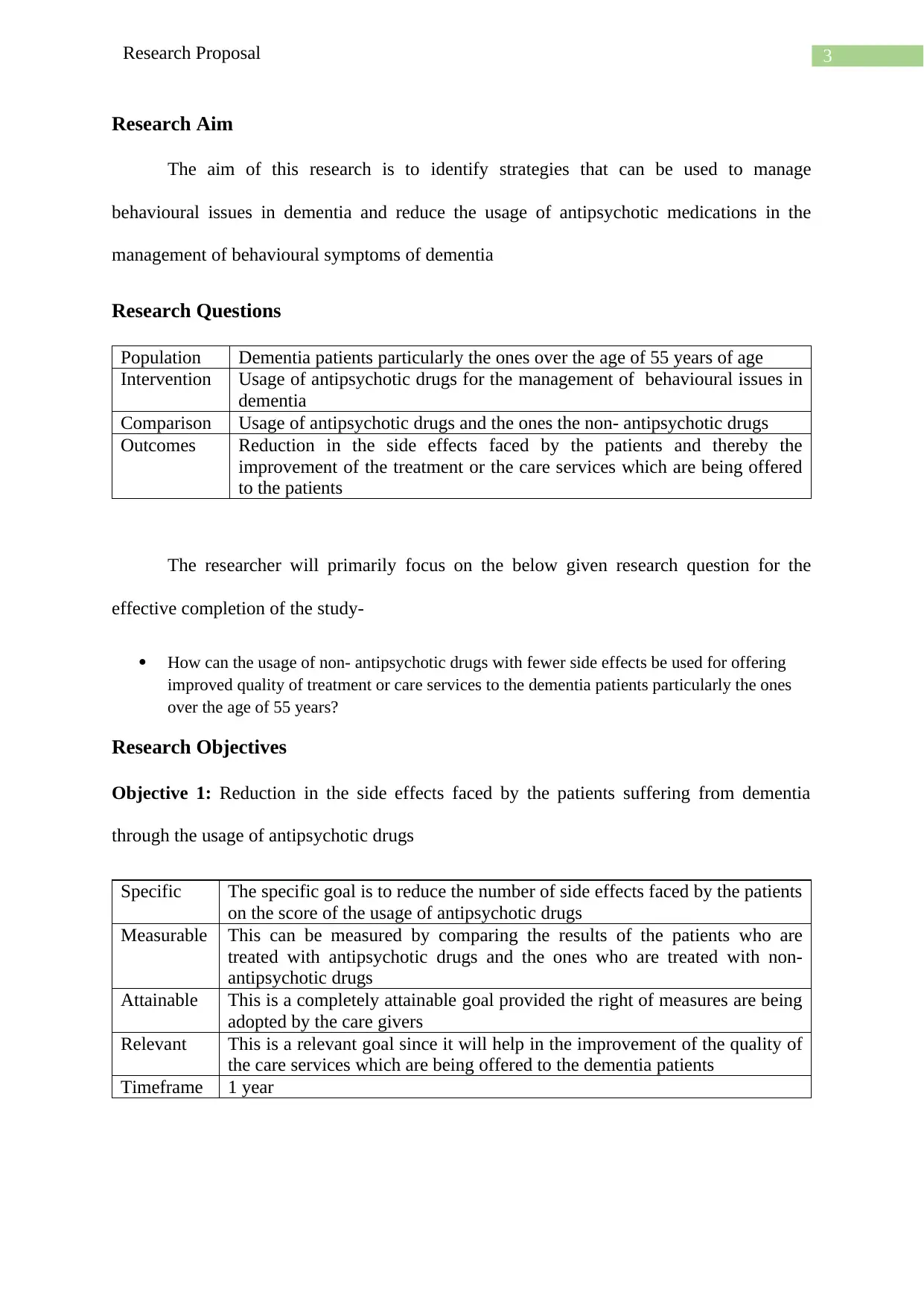
3Research Proposal
Research Aim
The aim of this research is to identify strategies that can be used to manage
behavioural issues in dementia and reduce the usage of antipsychotic medications in the
management of behavioural symptoms of dementia
Research Questions
Population Dementia patients particularly the ones over the age of 55 years of age
Intervention Usage of antipsychotic drugs for the management of behavioural issues in
dementia
Comparison Usage of antipsychotic drugs and the ones the non- antipsychotic drugs
Outcomes Reduction in the side effects faced by the patients and thereby the
improvement of the treatment or the care services which are being offered
to the patients
The researcher will primarily focus on the below given research question for the
effective completion of the study-
How can the usage of non- antipsychotic drugs with fewer side effects be used for offering
improved quality of treatment or care services to the dementia patients particularly the ones
over the age of 55 years?
Research Objectives
Objective 1: Reduction in the side effects faced by the patients suffering from dementia
through the usage of antipsychotic drugs
Specific The specific goal is to reduce the number of side effects faced by the patients
on the score of the usage of antipsychotic drugs
Measurable This can be measured by comparing the results of the patients who are
treated with antipsychotic drugs and the ones who are treated with non-
antipsychotic drugs
Attainable This is a completely attainable goal provided the right of measures are being
adopted by the care givers
Relevant This is a relevant goal since it will help in the improvement of the quality of
the care services which are being offered to the dementia patients
Timeframe 1 year
Research Aim
The aim of this research is to identify strategies that can be used to manage
behavioural issues in dementia and reduce the usage of antipsychotic medications in the
management of behavioural symptoms of dementia
Research Questions
Population Dementia patients particularly the ones over the age of 55 years of age
Intervention Usage of antipsychotic drugs for the management of behavioural issues in
dementia
Comparison Usage of antipsychotic drugs and the ones the non- antipsychotic drugs
Outcomes Reduction in the side effects faced by the patients and thereby the
improvement of the treatment or the care services which are being offered
to the patients
The researcher will primarily focus on the below given research question for the
effective completion of the study-
How can the usage of non- antipsychotic drugs with fewer side effects be used for offering
improved quality of treatment or care services to the dementia patients particularly the ones
over the age of 55 years?
Research Objectives
Objective 1: Reduction in the side effects faced by the patients suffering from dementia
through the usage of antipsychotic drugs
Specific The specific goal is to reduce the number of side effects faced by the patients
on the score of the usage of antipsychotic drugs
Measurable This can be measured by comparing the results of the patients who are
treated with antipsychotic drugs and the ones who are treated with non-
antipsychotic drugs
Attainable This is a completely attainable goal provided the right of measures are being
adopted by the care givers
Relevant This is a relevant goal since it will help in the improvement of the quality of
the care services which are being offered to the dementia patients
Timeframe 1 year
Paraphrase This Document
Need a fresh take? Get an instant paraphrase of this document with our AI Paraphraser
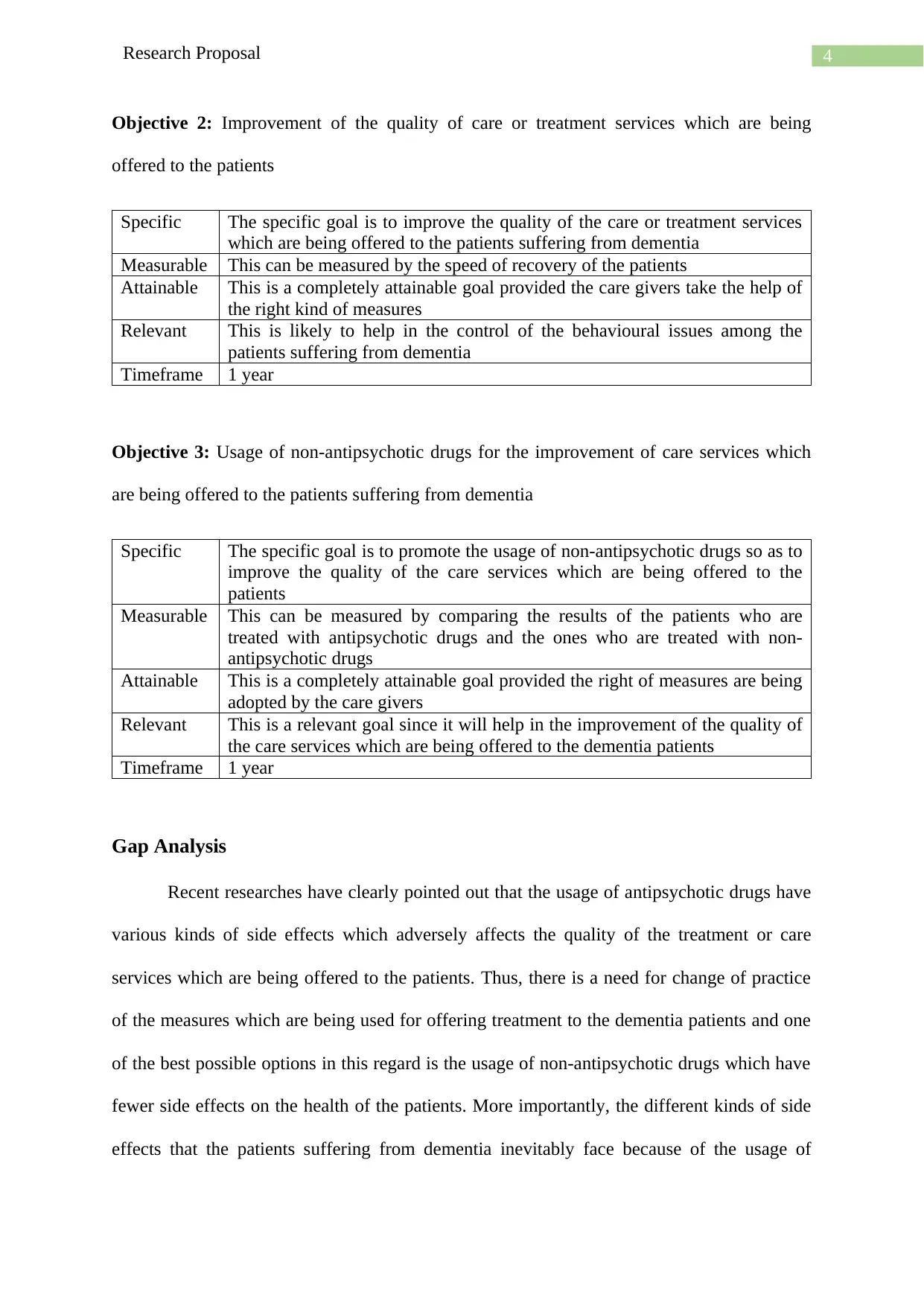
4Research Proposal
Objective 2: Improvement of the quality of care or treatment services which are being
offered to the patients
Specific The specific goal is to improve the quality of the care or treatment services
which are being offered to the patients suffering from dementia
Measurable This can be measured by the speed of recovery of the patients
Attainable This is a completely attainable goal provided the care givers take the help of
the right kind of measures
Relevant This is likely to help in the control of the behavioural issues among the
patients suffering from dementia
Timeframe 1 year
Objective 3: Usage of non-antipsychotic drugs for the improvement of care services which
are being offered to the patients suffering from dementia
Specific The specific goal is to promote the usage of non-antipsychotic drugs so as to
improve the quality of the care services which are being offered to the
patients
Measurable This can be measured by comparing the results of the patients who are
treated with antipsychotic drugs and the ones who are treated with non-
antipsychotic drugs
Attainable This is a completely attainable goal provided the right of measures are being
adopted by the care givers
Relevant This is a relevant goal since it will help in the improvement of the quality of
the care services which are being offered to the dementia patients
Timeframe 1 year
Gap Analysis
Recent researches have clearly pointed out that the usage of antipsychotic drugs have
various kinds of side effects which adversely affects the quality of the treatment or care
services which are being offered to the patients. Thus, there is a need for change of practice
of the measures which are being used for offering treatment to the dementia patients and one
of the best possible options in this regard is the usage of non-antipsychotic drugs which have
fewer side effects on the health of the patients. More importantly, the different kinds of side
effects that the patients suffering from dementia inevitably face because of the usage of
Objective 2: Improvement of the quality of care or treatment services which are being
offered to the patients
Specific The specific goal is to improve the quality of the care or treatment services
which are being offered to the patients suffering from dementia
Measurable This can be measured by the speed of recovery of the patients
Attainable This is a completely attainable goal provided the care givers take the help of
the right kind of measures
Relevant This is likely to help in the control of the behavioural issues among the
patients suffering from dementia
Timeframe 1 year
Objective 3: Usage of non-antipsychotic drugs for the improvement of care services which
are being offered to the patients suffering from dementia
Specific The specific goal is to promote the usage of non-antipsychotic drugs so as to
improve the quality of the care services which are being offered to the
patients
Measurable This can be measured by comparing the results of the patients who are
treated with antipsychotic drugs and the ones who are treated with non-
antipsychotic drugs
Attainable This is a completely attainable goal provided the right of measures are being
adopted by the care givers
Relevant This is a relevant goal since it will help in the improvement of the quality of
the care services which are being offered to the dementia patients
Timeframe 1 year
Gap Analysis
Recent researches have clearly pointed out that the usage of antipsychotic drugs have
various kinds of side effects which adversely affects the quality of the treatment or care
services which are being offered to the patients. Thus, there is a need for change of practice
of the measures which are being used for offering treatment to the dementia patients and one
of the best possible options in this regard is the usage of non-antipsychotic drugs which have
fewer side effects on the health of the patients. More importantly, the different kinds of side
effects that the patients suffering from dementia inevitably face because of the usage of
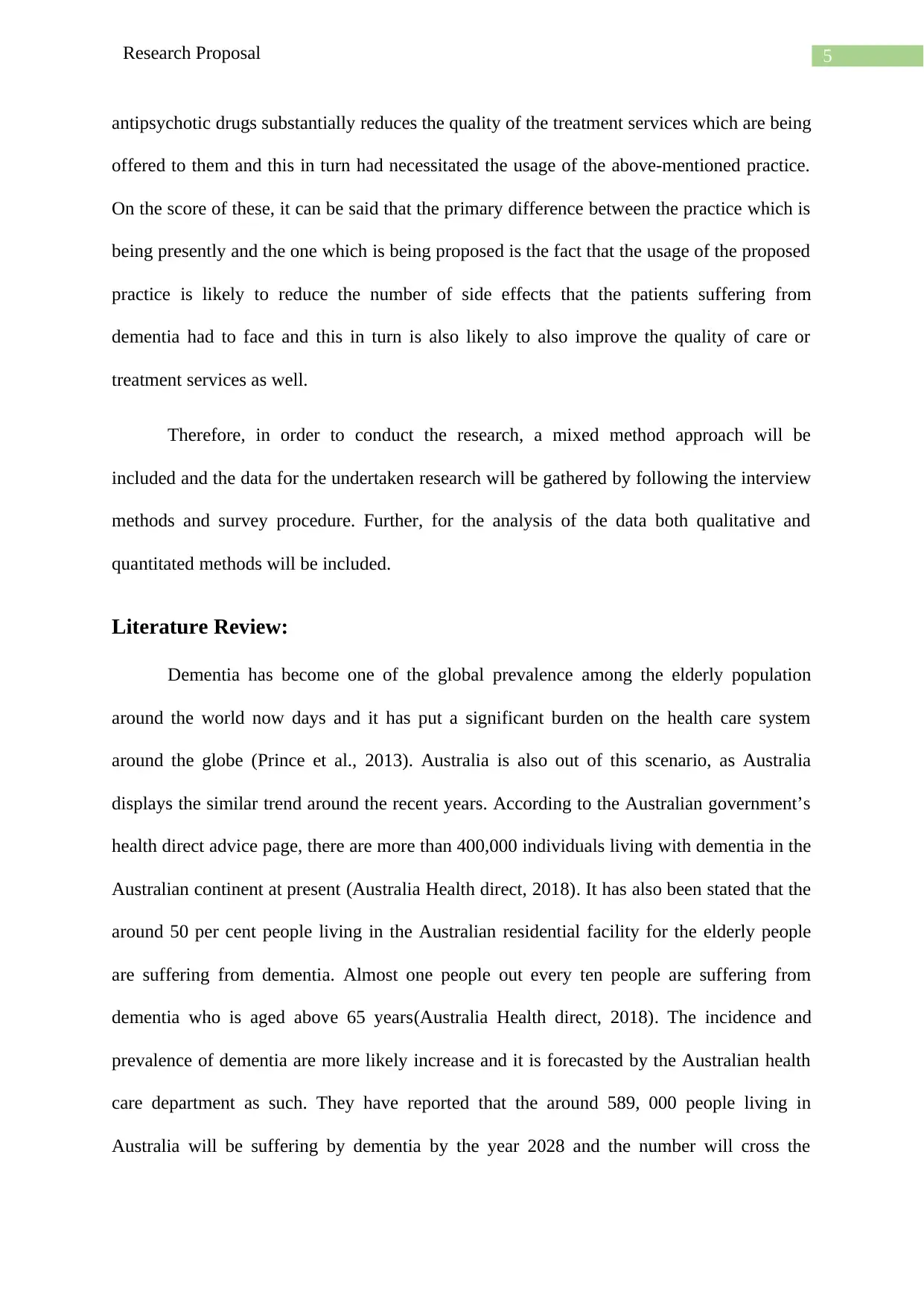
5Research Proposal
antipsychotic drugs substantially reduces the quality of the treatment services which are being
offered to them and this in turn had necessitated the usage of the above-mentioned practice.
On the score of these, it can be said that the primary difference between the practice which is
being presently and the one which is being proposed is the fact that the usage of the proposed
practice is likely to reduce the number of side effects that the patients suffering from
dementia had to face and this in turn is also likely to also improve the quality of care or
treatment services as well.
Therefore, in order to conduct the research, a mixed method approach will be
included and the data for the undertaken research will be gathered by following the interview
methods and survey procedure. Further, for the analysis of the data both qualitative and
quantitated methods will be included.
Literature Review:
Dementia has become one of the global prevalence among the elderly population
around the world now days and it has put a significant burden on the health care system
around the globe (Prince et al., 2013). Australia is also out of this scenario, as Australia
displays the similar trend around the recent years. According to the Australian government’s
health direct advice page, there are more than 400,000 individuals living with dementia in the
Australian continent at present (Australia Health direct, 2018). It has also been stated that the
around 50 per cent people living in the Australian residential facility for the elderly people
are suffering from dementia. Almost one people out every ten people are suffering from
dementia who is aged above 65 years(Australia Health direct, 2018). The incidence and
prevalence of dementia are more likely increase and it is forecasted by the Australian health
care department as such. They have reported that the around 589, 000 people living in
Australia will be suffering by dementia by the year 2028 and the number will cross the
antipsychotic drugs substantially reduces the quality of the treatment services which are being
offered to them and this in turn had necessitated the usage of the above-mentioned practice.
On the score of these, it can be said that the primary difference between the practice which is
being presently and the one which is being proposed is the fact that the usage of the proposed
practice is likely to reduce the number of side effects that the patients suffering from
dementia had to face and this in turn is also likely to also improve the quality of care or
treatment services as well.
Therefore, in order to conduct the research, a mixed method approach will be
included and the data for the undertaken research will be gathered by following the interview
methods and survey procedure. Further, for the analysis of the data both qualitative and
quantitated methods will be included.
Literature Review:
Dementia has become one of the global prevalence among the elderly population
around the world now days and it has put a significant burden on the health care system
around the globe (Prince et al., 2013). Australia is also out of this scenario, as Australia
displays the similar trend around the recent years. According to the Australian government’s
health direct advice page, there are more than 400,000 individuals living with dementia in the
Australian continent at present (Australia Health direct, 2018). It has also been stated that the
around 50 per cent people living in the Australian residential facility for the elderly people
are suffering from dementia. Almost one people out every ten people are suffering from
dementia who is aged above 65 years(Australia Health direct, 2018). The incidence and
prevalence of dementia are more likely increase and it is forecasted by the Australian health
care department as such. They have reported that the around 589, 000 people living in
Australia will be suffering by dementia by the year 2028 and the number will cross the
⊘ This is a preview!⊘
Do you want full access?
Subscribe today to unlock all pages.

Trusted by 1+ million students worldwide
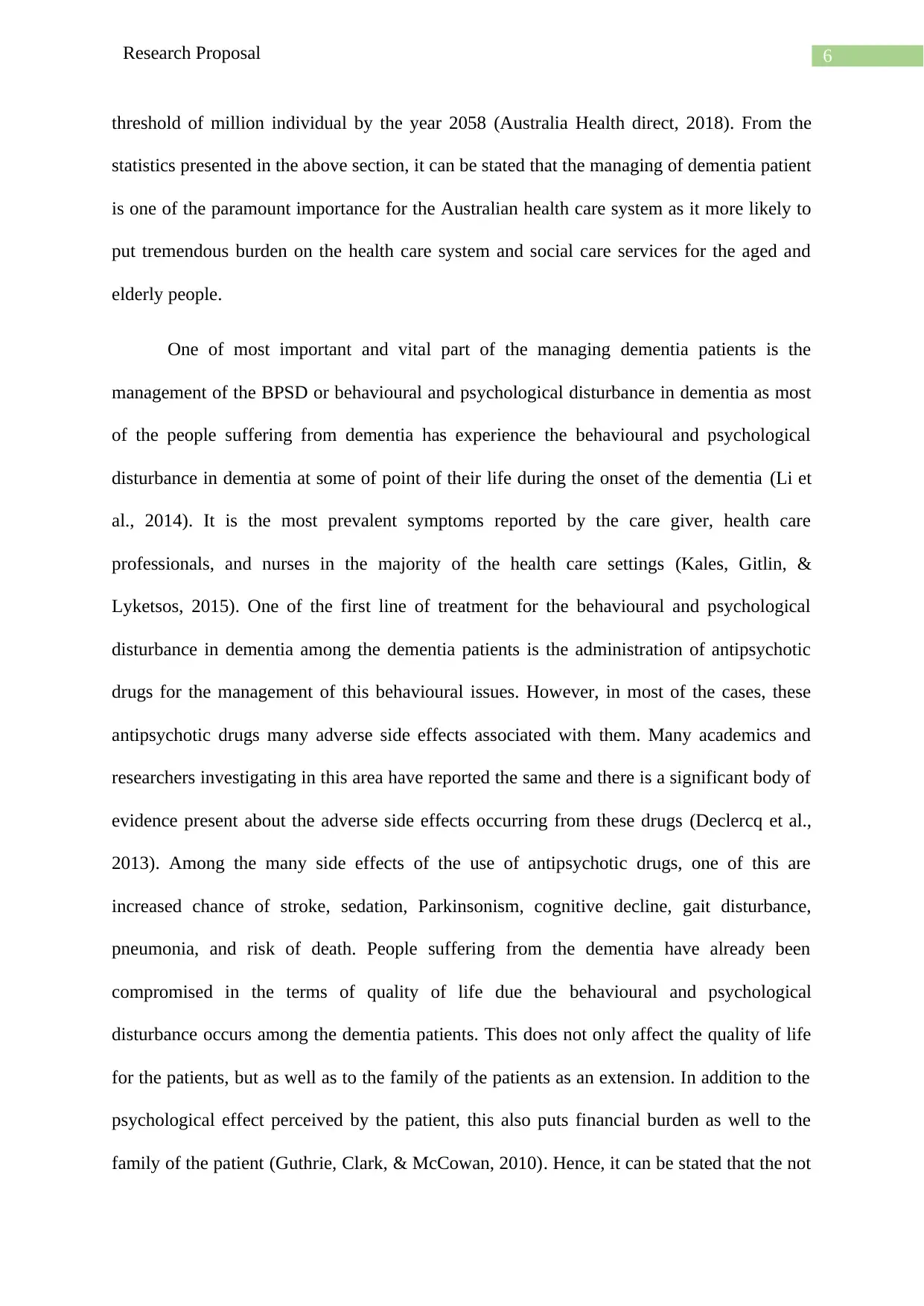
6Research Proposal
threshold of million individual by the year 2058 (Australia Health direct, 2018). From the
statistics presented in the above section, it can be stated that the managing of dementia patient
is one of the paramount importance for the Australian health care system as it more likely to
put tremendous burden on the health care system and social care services for the aged and
elderly people.
One of most important and vital part of the managing dementia patients is the
management of the BPSD or behavioural and psychological disturbance in dementia as most
of the people suffering from dementia has experience the behavioural and psychological
disturbance in dementia at some of point of their life during the onset of the dementia (Li et
al., 2014). It is the most prevalent symptoms reported by the care giver, health care
professionals, and nurses in the majority of the health care settings (Kales, Gitlin, &
Lyketsos, 2015). One of the first line of treatment for the behavioural and psychological
disturbance in dementia among the dementia patients is the administration of antipsychotic
drugs for the management of this behavioural issues. However, in most of the cases, these
antipsychotic drugs many adverse side effects associated with them. Many academics and
researchers investigating in this area have reported the same and there is a significant body of
evidence present about the adverse side effects occurring from these drugs (Declercq et al.,
2013). Among the many side effects of the use of antipsychotic drugs, one of this are
increased chance of stroke, sedation, Parkinsonism, cognitive decline, gait disturbance,
pneumonia, and risk of death. People suffering from the dementia have already been
compromised in the terms of quality of life due the behavioural and psychological
disturbance occurs among the dementia patients. This does not only affect the quality of life
for the patients, but as well as to the family of the patients as an extension. In addition to the
psychological effect perceived by the patient, this also puts financial burden as well to the
family of the patient (Guthrie, Clark, & McCowan, 2010). Hence, it can be stated that the not
threshold of million individual by the year 2058 (Australia Health direct, 2018). From the
statistics presented in the above section, it can be stated that the managing of dementia patient
is one of the paramount importance for the Australian health care system as it more likely to
put tremendous burden on the health care system and social care services for the aged and
elderly people.
One of most important and vital part of the managing dementia patients is the
management of the BPSD or behavioural and psychological disturbance in dementia as most
of the people suffering from dementia has experience the behavioural and psychological
disturbance in dementia at some of point of their life during the onset of the dementia (Li et
al., 2014). It is the most prevalent symptoms reported by the care giver, health care
professionals, and nurses in the majority of the health care settings (Kales, Gitlin, &
Lyketsos, 2015). One of the first line of treatment for the behavioural and psychological
disturbance in dementia among the dementia patients is the administration of antipsychotic
drugs for the management of this behavioural issues. However, in most of the cases, these
antipsychotic drugs many adverse side effects associated with them. Many academics and
researchers investigating in this area have reported the same and there is a significant body of
evidence present about the adverse side effects occurring from these drugs (Declercq et al.,
2013). Among the many side effects of the use of antipsychotic drugs, one of this are
increased chance of stroke, sedation, Parkinsonism, cognitive decline, gait disturbance,
pneumonia, and risk of death. People suffering from the dementia have already been
compromised in the terms of quality of life due the behavioural and psychological
disturbance occurs among the dementia patients. This does not only affect the quality of life
for the patients, but as well as to the family of the patients as an extension. In addition to the
psychological effect perceived by the patient, this also puts financial burden as well to the
family of the patient (Guthrie, Clark, & McCowan, 2010). Hence, it can be stated that the not
Paraphrase This Document
Need a fresh take? Get an instant paraphrase of this document with our AI Paraphraser
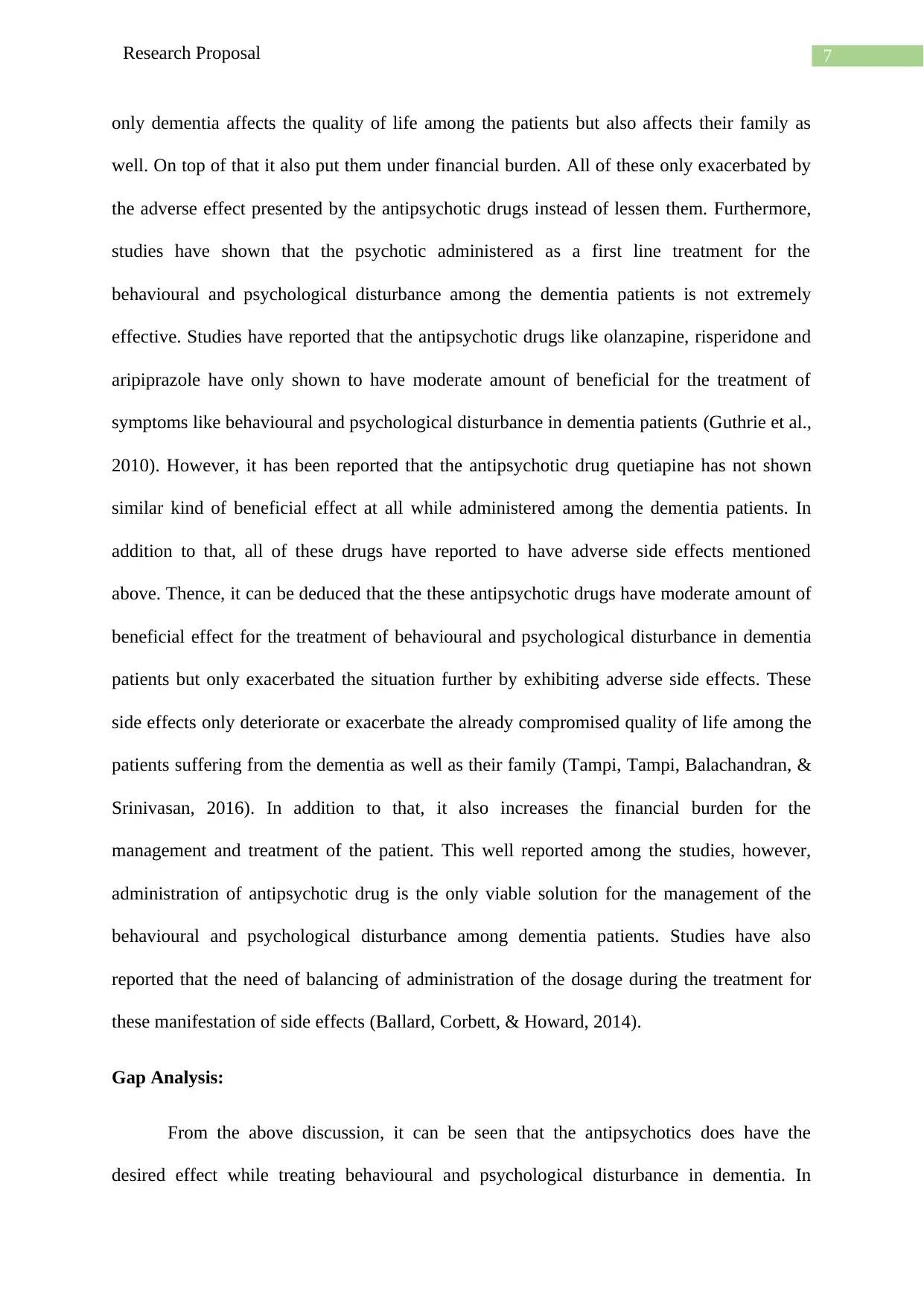
7Research Proposal
only dementia affects the quality of life among the patients but also affects their family as
well. On top of that it also put them under financial burden. All of these only exacerbated by
the adverse effect presented by the antipsychotic drugs instead of lessen them. Furthermore,
studies have shown that the psychotic administered as a first line treatment for the
behavioural and psychological disturbance among the dementia patients is not extremely
effective. Studies have reported that the antipsychotic drugs like olanzapine, risperidone and
aripiprazole have only shown to have moderate amount of beneficial for the treatment of
symptoms like behavioural and psychological disturbance in dementia patients (Guthrie et al.,
2010). However, it has been reported that the antipsychotic drug quetiapine has not shown
similar kind of beneficial effect at all while administered among the dementia patients. In
addition to that, all of these drugs have reported to have adverse side effects mentioned
above. Thence, it can be deduced that the these antipsychotic drugs have moderate amount of
beneficial effect for the treatment of behavioural and psychological disturbance in dementia
patients but only exacerbated the situation further by exhibiting adverse side effects. These
side effects only deteriorate or exacerbate the already compromised quality of life among the
patients suffering from the dementia as well as their family (Tampi, Tampi, Balachandran, &
Srinivasan, 2016). In addition to that, it also increases the financial burden for the
management and treatment of the patient. This well reported among the studies, however,
administration of antipsychotic drug is the only viable solution for the management of the
behavioural and psychological disturbance among dementia patients. Studies have also
reported that the need of balancing of administration of the dosage during the treatment for
these manifestation of side effects (Ballard, Corbett, & Howard, 2014).
Gap Analysis:
From the above discussion, it can be seen that the antipsychotics does have the
desired effect while treating behavioural and psychological disturbance in dementia. In
only dementia affects the quality of life among the patients but also affects their family as
well. On top of that it also put them under financial burden. All of these only exacerbated by
the adverse effect presented by the antipsychotic drugs instead of lessen them. Furthermore,
studies have shown that the psychotic administered as a first line treatment for the
behavioural and psychological disturbance among the dementia patients is not extremely
effective. Studies have reported that the antipsychotic drugs like olanzapine, risperidone and
aripiprazole have only shown to have moderate amount of beneficial for the treatment of
symptoms like behavioural and psychological disturbance in dementia patients (Guthrie et al.,
2010). However, it has been reported that the antipsychotic drug quetiapine has not shown
similar kind of beneficial effect at all while administered among the dementia patients. In
addition to that, all of these drugs have reported to have adverse side effects mentioned
above. Thence, it can be deduced that the these antipsychotic drugs have moderate amount of
beneficial effect for the treatment of behavioural and psychological disturbance in dementia
patients but only exacerbated the situation further by exhibiting adverse side effects. These
side effects only deteriorate or exacerbate the already compromised quality of life among the
patients suffering from the dementia as well as their family (Tampi, Tampi, Balachandran, &
Srinivasan, 2016). In addition to that, it also increases the financial burden for the
management and treatment of the patient. This well reported among the studies, however,
administration of antipsychotic drug is the only viable solution for the management of the
behavioural and psychological disturbance among dementia patients. Studies have also
reported that the need of balancing of administration of the dosage during the treatment for
these manifestation of side effects (Ballard, Corbett, & Howard, 2014).
Gap Analysis:
From the above discussion, it can be seen that the antipsychotics does have the
desired effect while treating behavioural and psychological disturbance in dementia. In
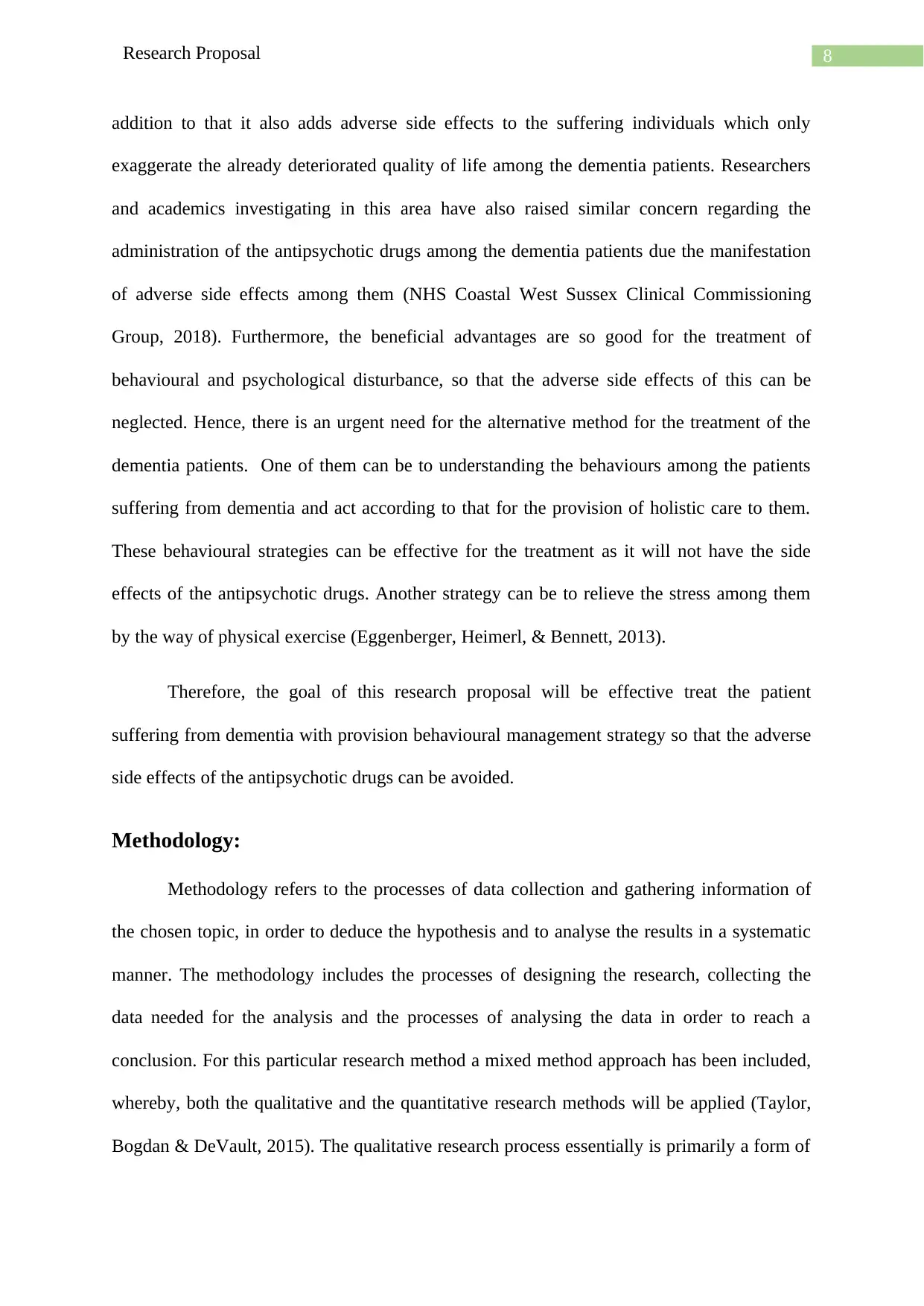
8Research Proposal
addition to that it also adds adverse side effects to the suffering individuals which only
exaggerate the already deteriorated quality of life among the dementia patients. Researchers
and academics investigating in this area have also raised similar concern regarding the
administration of the antipsychotic drugs among the dementia patients due the manifestation
of adverse side effects among them (NHS Coastal West Sussex Clinical Commissioning
Group, 2018). Furthermore, the beneficial advantages are so good for the treatment of
behavioural and psychological disturbance, so that the adverse side effects of this can be
neglected. Hence, there is an urgent need for the alternative method for the treatment of the
dementia patients. One of them can be to understanding the behaviours among the patients
suffering from dementia and act according to that for the provision of holistic care to them.
These behavioural strategies can be effective for the treatment as it will not have the side
effects of the antipsychotic drugs. Another strategy can be to relieve the stress among them
by the way of physical exercise (Eggenberger, Heimerl, & Bennett, 2013).
Therefore, the goal of this research proposal will be effective treat the patient
suffering from dementia with provision behavioural management strategy so that the adverse
side effects of the antipsychotic drugs can be avoided.
Methodology:
Methodology refers to the processes of data collection and gathering information of
the chosen topic, in order to deduce the hypothesis and to analyse the results in a systematic
manner. The methodology includes the processes of designing the research, collecting the
data needed for the analysis and the processes of analysing the data in order to reach a
conclusion. For this particular research method a mixed method approach has been included,
whereby, both the qualitative and the quantitative research methods will be applied (Taylor,
Bogdan & DeVault, 2015). The qualitative research process essentially is primarily a form of
addition to that it also adds adverse side effects to the suffering individuals which only
exaggerate the already deteriorated quality of life among the dementia patients. Researchers
and academics investigating in this area have also raised similar concern regarding the
administration of the antipsychotic drugs among the dementia patients due the manifestation
of adverse side effects among them (NHS Coastal West Sussex Clinical Commissioning
Group, 2018). Furthermore, the beneficial advantages are so good for the treatment of
behavioural and psychological disturbance, so that the adverse side effects of this can be
neglected. Hence, there is an urgent need for the alternative method for the treatment of the
dementia patients. One of them can be to understanding the behaviours among the patients
suffering from dementia and act according to that for the provision of holistic care to them.
These behavioural strategies can be effective for the treatment as it will not have the side
effects of the antipsychotic drugs. Another strategy can be to relieve the stress among them
by the way of physical exercise (Eggenberger, Heimerl, & Bennett, 2013).
Therefore, the goal of this research proposal will be effective treat the patient
suffering from dementia with provision behavioural management strategy so that the adverse
side effects of the antipsychotic drugs can be avoided.
Methodology:
Methodology refers to the processes of data collection and gathering information of
the chosen topic, in order to deduce the hypothesis and to analyse the results in a systematic
manner. The methodology includes the processes of designing the research, collecting the
data needed for the analysis and the processes of analysing the data in order to reach a
conclusion. For this particular research method a mixed method approach has been included,
whereby, both the qualitative and the quantitative research methods will be applied (Taylor,
Bogdan & DeVault, 2015). The qualitative research process essentially is primarily a form of
⊘ This is a preview!⊘
Do you want full access?
Subscribe today to unlock all pages.

Trusted by 1+ million students worldwide
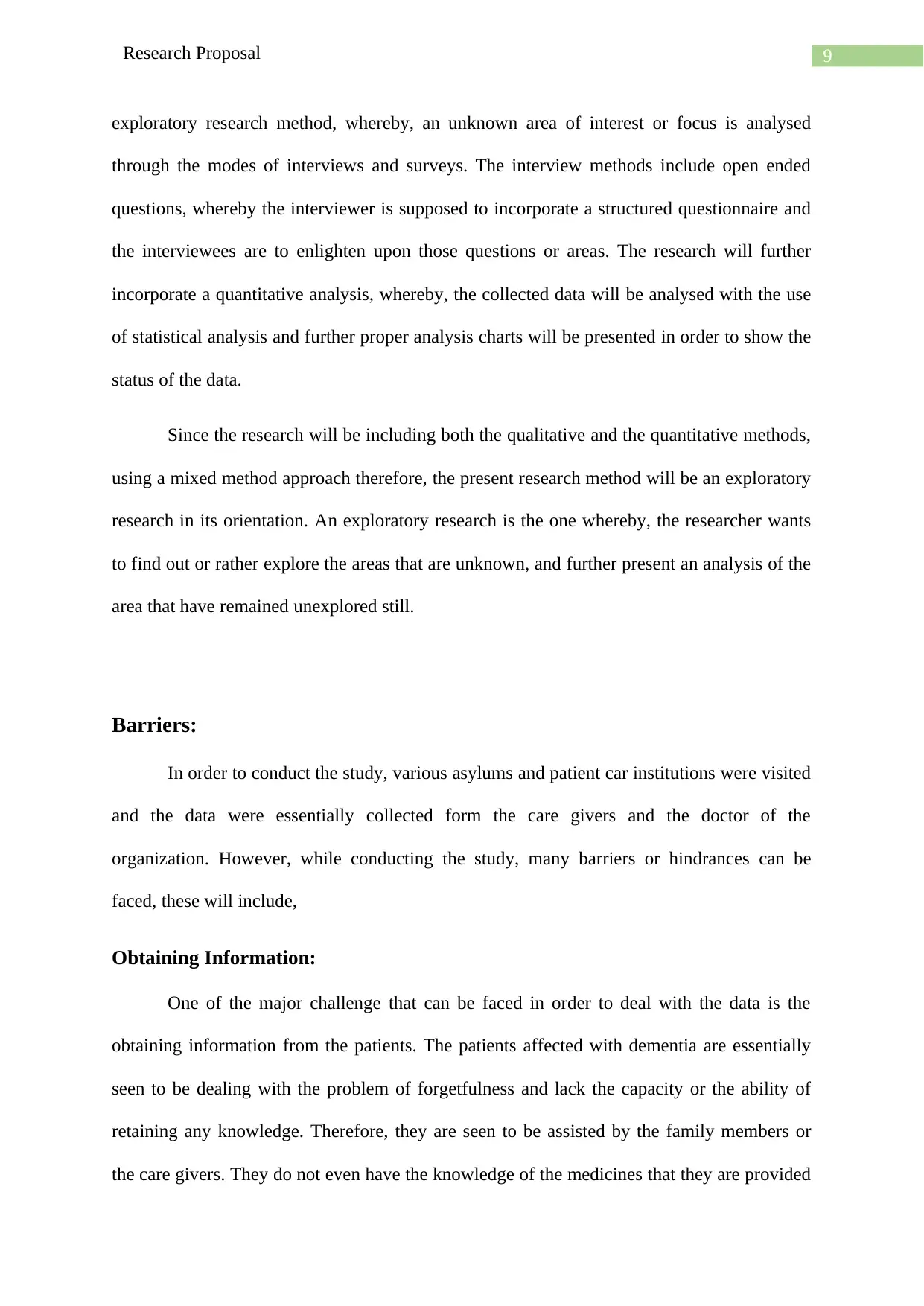
9Research Proposal
exploratory research method, whereby, an unknown area of interest or focus is analysed
through the modes of interviews and surveys. The interview methods include open ended
questions, whereby the interviewer is supposed to incorporate a structured questionnaire and
the interviewees are to enlighten upon those questions or areas. The research will further
incorporate a quantitative analysis, whereby, the collected data will be analysed with the use
of statistical analysis and further proper analysis charts will be presented in order to show the
status of the data.
Since the research will be including both the qualitative and the quantitative methods,
using a mixed method approach therefore, the present research method will be an exploratory
research in its orientation. An exploratory research is the one whereby, the researcher wants
to find out or rather explore the areas that are unknown, and further present an analysis of the
area that have remained unexplored still.
Barriers:
In order to conduct the study, various asylums and patient car institutions were visited
and the data were essentially collected form the care givers and the doctor of the
organization. However, while conducting the study, many barriers or hindrances can be
faced, these will include,
Obtaining Information:
One of the major challenge that can be faced in order to deal with the data is the
obtaining information from the patients. The patients affected with dementia are essentially
seen to be dealing with the problem of forgetfulness and lack the capacity or the ability of
retaining any knowledge. Therefore, they are seen to be assisted by the family members or
the care givers. They do not even have the knowledge of the medicines that they are provided
exploratory research method, whereby, an unknown area of interest or focus is analysed
through the modes of interviews and surveys. The interview methods include open ended
questions, whereby the interviewer is supposed to incorporate a structured questionnaire and
the interviewees are to enlighten upon those questions or areas. The research will further
incorporate a quantitative analysis, whereby, the collected data will be analysed with the use
of statistical analysis and further proper analysis charts will be presented in order to show the
status of the data.
Since the research will be including both the qualitative and the quantitative methods,
using a mixed method approach therefore, the present research method will be an exploratory
research in its orientation. An exploratory research is the one whereby, the researcher wants
to find out or rather explore the areas that are unknown, and further present an analysis of the
area that have remained unexplored still.
Barriers:
In order to conduct the study, various asylums and patient car institutions were visited
and the data were essentially collected form the care givers and the doctor of the
organization. However, while conducting the study, many barriers or hindrances can be
faced, these will include,
Obtaining Information:
One of the major challenge that can be faced in order to deal with the data is the
obtaining information from the patients. The patients affected with dementia are essentially
seen to be dealing with the problem of forgetfulness and lack the capacity or the ability of
retaining any knowledge. Therefore, they are seen to be assisted by the family members or
the care givers. They do not even have the knowledge of the medicines that they are provided
Paraphrase This Document
Need a fresh take? Get an instant paraphrase of this document with our AI Paraphraser
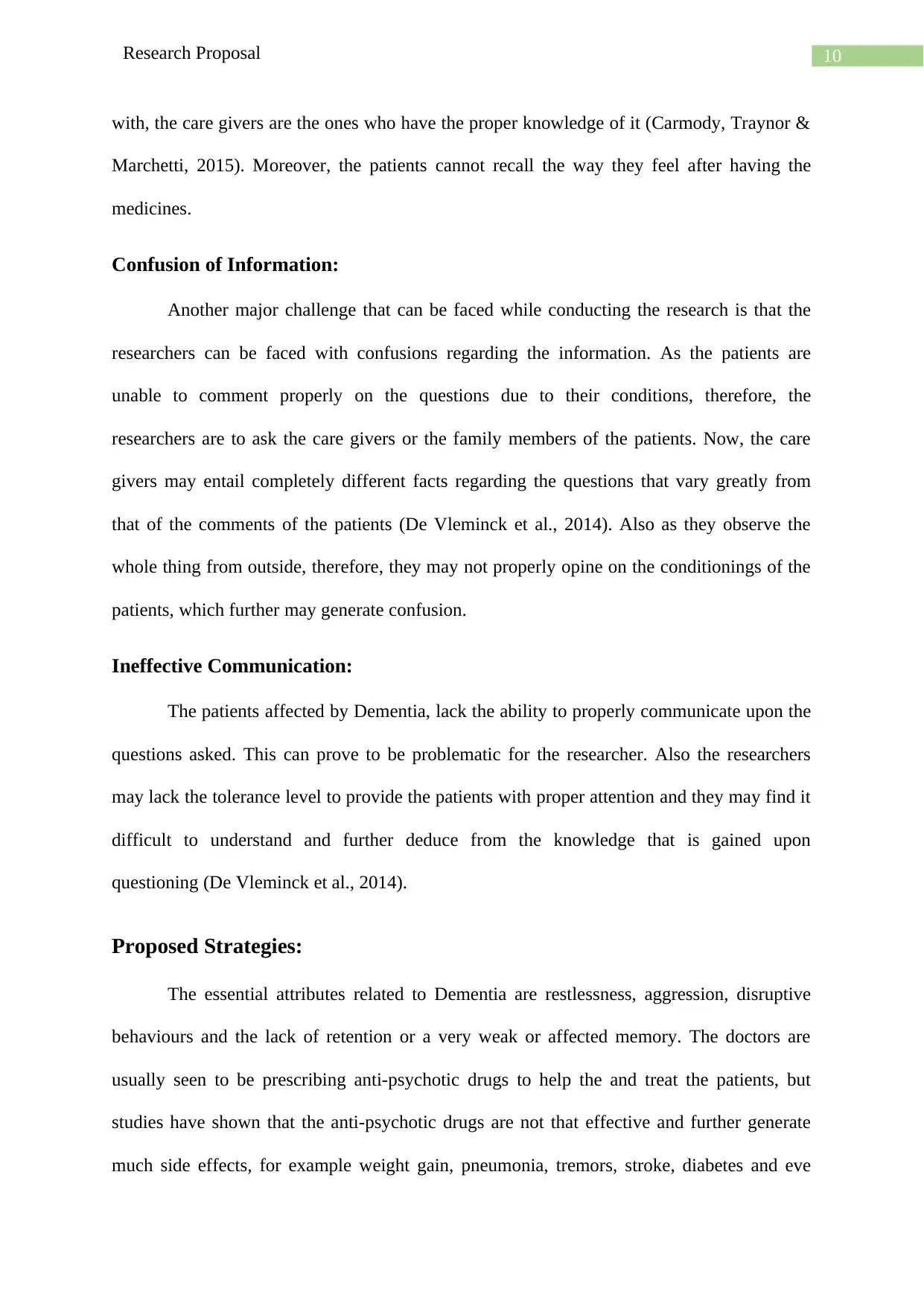
10Research Proposal
with, the care givers are the ones who have the proper knowledge of it (Carmody, Traynor &
Marchetti, 2015). Moreover, the patients cannot recall the way they feel after having the
medicines.
Confusion of Information:
Another major challenge that can be faced while conducting the research is that the
researchers can be faced with confusions regarding the information. As the patients are
unable to comment properly on the questions due to their conditions, therefore, the
researchers are to ask the care givers or the family members of the patients. Now, the care
givers may entail completely different facts regarding the questions that vary greatly from
that of the comments of the patients (De Vleminck et al., 2014). Also as they observe the
whole thing from outside, therefore, they may not properly opine on the conditionings of the
patients, which further may generate confusion.
Ineffective Communication:
The patients affected by Dementia, lack the ability to properly communicate upon the
questions asked. This can prove to be problematic for the researcher. Also the researchers
may lack the tolerance level to provide the patients with proper attention and they may find it
difficult to understand and further deduce from the knowledge that is gained upon
questioning (De Vleminck et al., 2014).
Proposed Strategies:
The essential attributes related to Dementia are restlessness, aggression, disruptive
behaviours and the lack of retention or a very weak or affected memory. The doctors are
usually seen to be prescribing anti-psychotic drugs to help the and treat the patients, but
studies have shown that the anti-psychotic drugs are not that effective and further generate
much side effects, for example weight gain, pneumonia, tremors, stroke, diabetes and eve
with, the care givers are the ones who have the proper knowledge of it (Carmody, Traynor &
Marchetti, 2015). Moreover, the patients cannot recall the way they feel after having the
medicines.
Confusion of Information:
Another major challenge that can be faced while conducting the research is that the
researchers can be faced with confusions regarding the information. As the patients are
unable to comment properly on the questions due to their conditions, therefore, the
researchers are to ask the care givers or the family members of the patients. Now, the care
givers may entail completely different facts regarding the questions that vary greatly from
that of the comments of the patients (De Vleminck et al., 2014). Also as they observe the
whole thing from outside, therefore, they may not properly opine on the conditionings of the
patients, which further may generate confusion.
Ineffective Communication:
The patients affected by Dementia, lack the ability to properly communicate upon the
questions asked. This can prove to be problematic for the researcher. Also the researchers
may lack the tolerance level to provide the patients with proper attention and they may find it
difficult to understand and further deduce from the knowledge that is gained upon
questioning (De Vleminck et al., 2014).
Proposed Strategies:
The essential attributes related to Dementia are restlessness, aggression, disruptive
behaviours and the lack of retention or a very weak or affected memory. The doctors are
usually seen to be prescribing anti-psychotic drugs to help the and treat the patients, but
studies have shown that the anti-psychotic drugs are not that effective and further generate
much side effects, for example weight gain, pneumonia, tremors, stroke, diabetes and eve
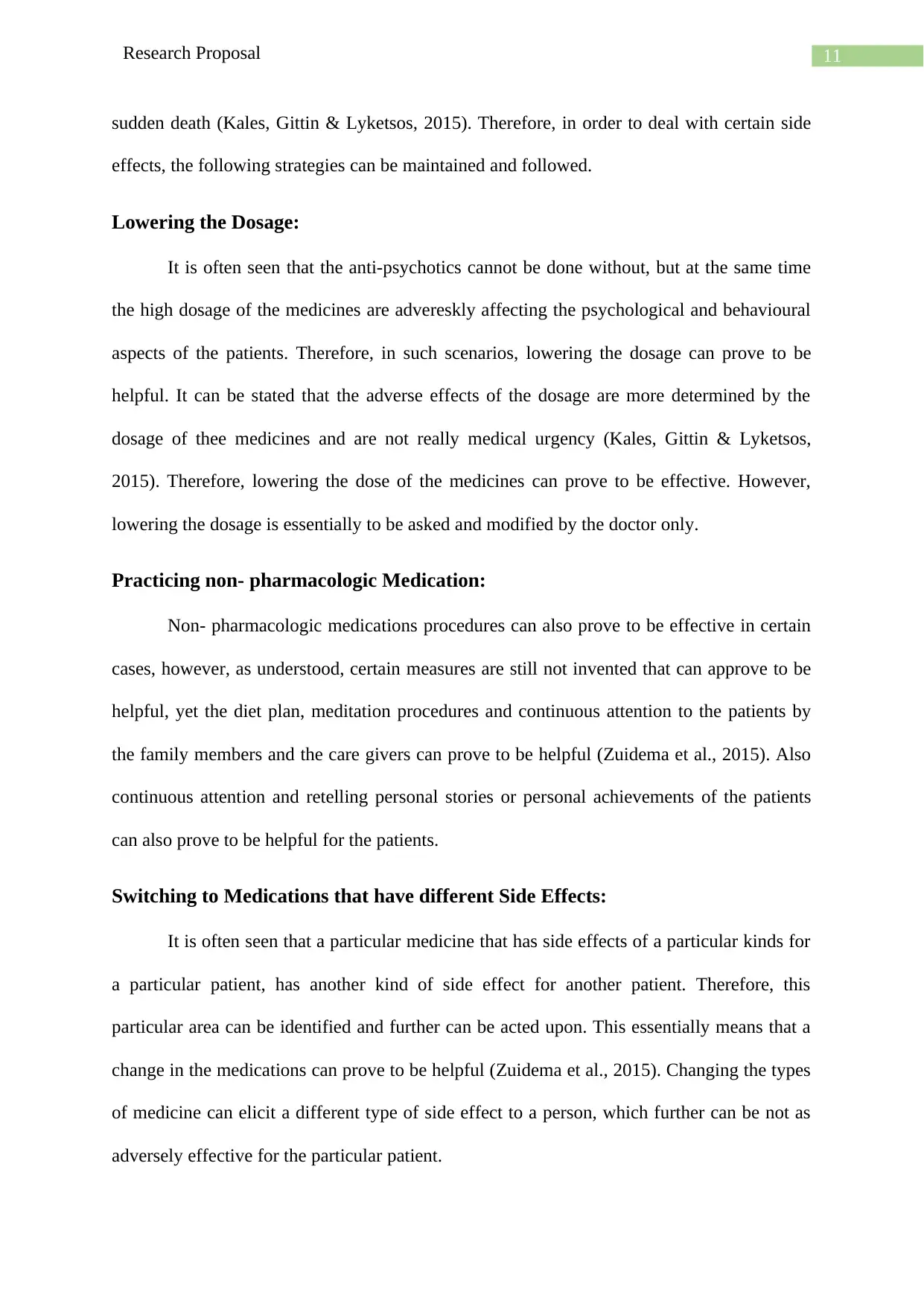
11Research Proposal
sudden death (Kales, Gittin & Lyketsos, 2015). Therefore, in order to deal with certain side
effects, the following strategies can be maintained and followed.
Lowering the Dosage:
It is often seen that the anti-psychotics cannot be done without, but at the same time
the high dosage of the medicines are advereskly affecting the psychological and behavioural
aspects of the patients. Therefore, in such scenarios, lowering the dosage can prove to be
helpful. It can be stated that the adverse effects of the dosage are more determined by the
dosage of thee medicines and are not really medical urgency (Kales, Gittin & Lyketsos,
2015). Therefore, lowering the dose of the medicines can prove to be effective. However,
lowering the dosage is essentially to be asked and modified by the doctor only.
Practicing non- pharmacologic Medication:
Non- pharmacologic medications procedures can also prove to be effective in certain
cases, however, as understood, certain measures are still not invented that can approve to be
helpful, yet the diet plan, meditation procedures and continuous attention to the patients by
the family members and the care givers can prove to be helpful (Zuidema et al., 2015). Also
continuous attention and retelling personal stories or personal achievements of the patients
can also prove to be helpful for the patients.
Switching to Medications that have different Side Effects:
It is often seen that a particular medicine that has side effects of a particular kinds for
a particular patient, has another kind of side effect for another patient. Therefore, this
particular area can be identified and further can be acted upon. This essentially means that a
change in the medications can prove to be helpful (Zuidema et al., 2015). Changing the types
of medicine can elicit a different type of side effect to a person, which further can be not as
adversely effective for the particular patient.
sudden death (Kales, Gittin & Lyketsos, 2015). Therefore, in order to deal with certain side
effects, the following strategies can be maintained and followed.
Lowering the Dosage:
It is often seen that the anti-psychotics cannot be done without, but at the same time
the high dosage of the medicines are advereskly affecting the psychological and behavioural
aspects of the patients. Therefore, in such scenarios, lowering the dosage can prove to be
helpful. It can be stated that the adverse effects of the dosage are more determined by the
dosage of thee medicines and are not really medical urgency (Kales, Gittin & Lyketsos,
2015). Therefore, lowering the dose of the medicines can prove to be effective. However,
lowering the dosage is essentially to be asked and modified by the doctor only.
Practicing non- pharmacologic Medication:
Non- pharmacologic medications procedures can also prove to be effective in certain
cases, however, as understood, certain measures are still not invented that can approve to be
helpful, yet the diet plan, meditation procedures and continuous attention to the patients by
the family members and the care givers can prove to be helpful (Zuidema et al., 2015). Also
continuous attention and retelling personal stories or personal achievements of the patients
can also prove to be helpful for the patients.
Switching to Medications that have different Side Effects:
It is often seen that a particular medicine that has side effects of a particular kinds for
a particular patient, has another kind of side effect for another patient. Therefore, this
particular area can be identified and further can be acted upon. This essentially means that a
change in the medications can prove to be helpful (Zuidema et al., 2015). Changing the types
of medicine can elicit a different type of side effect to a person, which further can be not as
adversely effective for the particular patient.
⊘ This is a preview!⊘
Do you want full access?
Subscribe today to unlock all pages.

Trusted by 1+ million students worldwide
1 out of 18
Related Documents
Your All-in-One AI-Powered Toolkit for Academic Success.
+13062052269
info@desklib.com
Available 24*7 on WhatsApp / Email
![[object Object]](/_next/static/media/star-bottom.7253800d.svg)
Unlock your academic potential
Copyright © 2020–2026 A2Z Services. All Rights Reserved. Developed and managed by ZUCOL.





